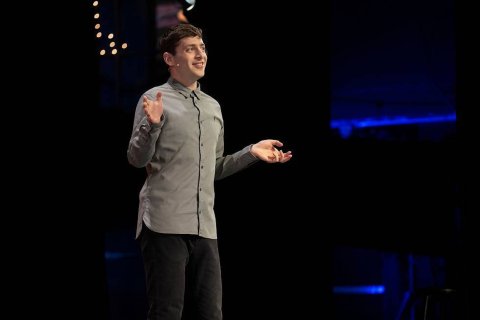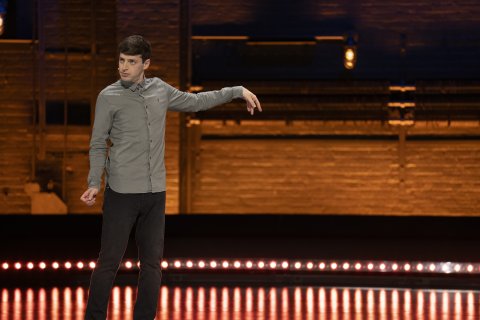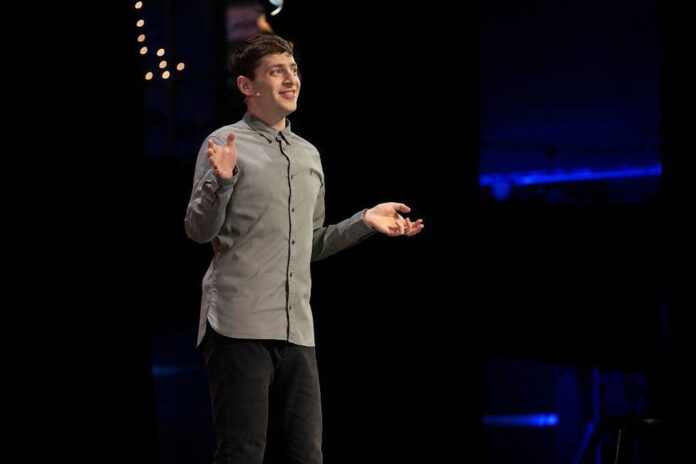Matt Winkelmeyer/Getty Images
“One person’s personal ethic is not another person’s personal ethic.”
A Jew accidentally stumbles upon a gathering of white nationalists. For most, this would be a cause for concern, but for Alex Edelman it’s an opportunity for a hit one-man comedy show. “I always wanted to be a stand-up. I always thought that stand-up was the most fun, cool, delightful thing.” Edelman’s new HBO comedy special Just For Us (April 6) follows his successful Broadway run, where the comedian shares the impact this accidental meeting had on him. “I’d never want to be famous, but I’ve always wanted—and this feels grosser—but I’ve always wanted the respect of my peers.” And he’s gotten it, with many celebrities attending his sold-out shows. Edelman says his show is for everyone. “Judaism is a huge part of who I am. I’m very proud of it generally. But I perform for non-Jewish audiences. So being a public Jew, it’s put me in a position to speak to young Jews in a way that I wish I had been spoken to.” After six years of doing the show, Edelman is looking forward to other creative pursuits. “My brain is going to have to start gathering again.”
SUBSCRIBE TO THE PARTING SHOT WITH H. ALAN SCOTT
ON APPLE PODCASTS OR SPOTIFY
Editor’s Note: This conversation has been edited and condensed for publication.
How did this go from a story to this massive Broadway show?
I was thinking of this on my bike today. (Not to brag, but I bike.) But other people really made it happen. The people who I told the story to who would ask provocations story-wise, or the advocates for this story who said this is something slightly bigger. But I started it at a storytelling night in New York in front of like 32 people. And then in London at a pub behind a shoe store. But I owe two people big time, I owe Adam Brace [director of the live show Just for Us] and I owe Mike Birbiglia [producer]. Also, in terms of the special, I owe Alex Timbers [director of the filmed special Just for Us], who had the only vision for how to translate this to film. But it was those guys, Brace and Birbiglia, who initially elevated the show, Brace did it first and then Mike came in and was like, “I’m sorry, but you need to change this, this and this.” Like [Mike gave] six notes, but they were all life-changing notes. And every comedy legend who came to the show, I’d ask them for help. So Billy Crystal was the reason they use one of these [mouth] mics instead of one of these [handheld] mics. It was the biggest note that I got from one of those big guys. [Jerry] Seinfeld gave a great note. Steve Martin gave me a joke for the show.
How do you feel when these comedy icons that you probably looked up to are having conversations with you?
I mean, it’s the best thing in the world. I do this because I’m a fan. I’m not sure if I’m supposed to stop admitting that at some point, but I just always loved stand-up. I always wanted to be a stand-up. I always thought that stand-up was the most fun, cool, delightful thing in the world. And I’ve fallen in love with different things, poetry, writing, pottery, different types of sports, I’ve gone through phases, but my love of stand-up and wanting to be a stand-up, wanting to be part of this community of comedians, but also wanting to sort of diversify what comedy can be in terms of its aesthetic and its content. Sometimes people come to me after the show; they’re like, “I don’t like comedy, but I like this.” And I’m like, “Well, you’re just not getting the right kind of comedy.” And then when I got to New York, I wanted to be part of the theater community also. So when those people come in, you feel the immediacy of that community in your face. I’d never want to be famous, but I’ve always wanted—and this feels grosser—but I’ve always wanted the respect of my peers, to be thought of as worth reckoning with people that I reckoned with growing up. It’s the most wonderful thing. The day after the opening I got a FaceTime from Norman Lear saying, “The reviews!”
That’s probably the only FaceTime you’ll ever receive from a person 100 years old.
1,000 percent. One of my favorite comics is this guy named Tom Lehrer, and he’s a bit of a recluse. He’s in his 90s. Sometimes I knock on his door. Sometimes he lets me in, and sometimes he shoos me away. But I’ve loved comedians my whole adult life, and that I started a show they’d come to see is really special.

Sarah Shatz/HBO
As a Jew, naturally I have a reaction, but what has the gentile reaction been?
I wrote the show for gentiles. I’m very happy that Jews feel seen by the show, that’s really wonderful. And it would have been nice to have a piece like this when I was growing up. But I wrote the show for Australians and Scots in its first two iterations, and also our audiences are largely non-Jewish. Sometimes I’ll go to a city and I’m like, “Oh, they turned out the Jewish community for this one.” But it’s a comedy show, the show is just full of jokes, so yeah, non-Jewish audiences seem to appreciate it just as much. I love anyone who comes to see the show. I’m grateful.
In the show you talk about performing, how we’re all kind of performing. Has doing this show made you more aware of those moments where you’re performing?
It’s not my Jewishness that I feel the need to perform. I’m actually very comfortable in my Jewishness. That’s probably the only thing I’m comfortable with. So I never play more or less Jewish, I show up as I am. But there are other things I will pretend to be smarter than, or I will pretend to be dumber than, or I will pretend to be more or less local than I am depending on who is there. I think when I’m in the U.K., I sometimes I will find myself being more American because I realized that in that situation to be less attuned to whatever is happening is actually an advantage. Right? It’s code switching, to broadly apply that phrase that has more input for different people, it’s something that we all do, right? We all pretend to be X, Y or Z.
One of the things that even I’ve had to address is how do we, as public Jews, be publicly Jewish in a world right now where it’s complicated to be Jewish?
Obviously, I feel such complication around October 7 and it’s aftermath, but I don’t feel weird about my Judaism. There are things that I don’t like about being Jewish, there are things that I find challenging. But like, just in terms of applying it to this conflict, Judaism teaches something that, in its traditional sense, is something that we’re used to in American discourse, which is the idea of holding two seemingly contradictory notions at once and trying very hard to reconcile those three notions. And so, especially in the incidents of October 7, where there’s so much pain on so many sides, and everyone’s got so many differing datasets they’re operating out of, opinions, things that they’re deciding to look at, things that they’re deciding to ignore, that viewpoint, zooming out to a bird’s-eye view but also being conscious of the bugs-eye view are understanding the responsibility that you have as an individual, what you owe to various collectives, like those tensions. My Judaism informs that. But, I perform a lot, I am deeply insecure, I am very scared all the time that I have done something that will get me in trouble or that I will do something or that I’ll say the wrong thing, but in my Judaism, I don’t see myself in this sphere as simply a Jew. Judaism is a huge part of who I am. I’m very proud of it generally. But I perform for non-Jewish audiences and am very accessible. Most of my friends are not Jewish just because of the percentages. And so being a public Jew, it’s put me in a position to speak to young Jews in a way that I wish I had been spoken to.

Sarah Shatz/HBO
Because of October 7 and other things, what kind of questions have you been asked post-show? Have they changed over the course of the show?
People asked me if anyone from the white nationalists meeting has seen the show. And I have no idea if they [have]. If you guys do, please get in touch. I thought I saw one of them in Union Square, but I wasn’t gonna go up to ’em and be like, “Sorry, do I know you from a meeting of white nationalists in Queens?” I thought that would be a bad idea. People asked me a lot if I’m afraid. I’m not, but there were a few days where someone said that they were going to come to San Francisco on October 29 and behead me in front of my Zionist buddies. And I was like, “Well, the show ends on October 28, I’m not going to like stay an extra day to get beheaded.” I’m getting out of town. Also, the guy was a teenager from like, Tunisia, I don’t know that he had all of his Delta miles together to come behead me. By the way, that was a moment of very heightened rhetoric and I became a little more selective in DMs after that. But I’m not afraid. In terms of questions, people will ask very granular questions about the show, people ask about my family life, people ask my opinions on things like October 7. I’m always happy to talk person to person about pretty much anything. It’s very fun and interesting.
And no matter what question it is, it’s from a show inspiring them to think and ask the question in the first place.
It’s interesting to do a show that is so clearly a comedy show, but also has other elements to it. Like to have a story of the key people engaged, and people have their own takes on the story, which is so interesting. Sometimes people really get hung up on a detail. Sometimes I have to remind people that the show is not a think piece—the show is entertaining, I am there to entertain. People love to tell me their stories of having Christmas because there’s a story about our family having [Christmas]. People love to come up to me, Jews, non-Jews, to tell me their stories about how they had Christmas, and I love that so much. It’s so cute. It’s adorable. I love hearing about how people celebrate or people tell me about the time that they celebrated a holiday for someone from another religion. Someone had nowhere to go for Ramadan breakfast or Easter or Passover. I love hearing any sort of interfaith story, it’s the most delightful thing.
With the success of the show, how has this changed your approach to writing comedy?
I don’t know yet. You know what it has done, it’s made me find little jokes and choices. It made me realize that comedy can come from smaller things. As I play spaces that are much bigger than I used to, it’s also going to be smaller and realizing that you can go quiet. In terms of how I perform certainly has changed me a huge amount and also doing literally thousands of hours of comedy. I’ve done the show probably hundreds of times, an hour-and-a-half; it’s a lot. But I’ve done a lot of comedy now. I terms of what I write, I think the jokes have a higher standard. Obviously I perform every joke like Jerry Seinfeld might see it at some point. Sometimes I get like, “Would I want Seinfeld to see that joke?” I am much more conscious of that. Also, you do a joke X number of times, you start to form an ethic around the joke. In my first show there was a joke about someone’s weight, and it wasn’t a fat joke. It wouldn’t even be taboo now. It wasn’t at the expense of a specific person. But I made a joke about how someone’s weight, [in the United States] I say it in pounds, and then I go, “You know, in England they use stone.” So I’d say the person was one boulder, which is a good joke, technically, right? It’s a good joke, gets a laugh. This isn’t about punching down, because I think that’s lazy, these things can be more complicated than that sometimes. But, after a while, certain jokes stopped sitting well with you. And there were a few jokes in my show just stopped sitting well with me, so I cut them. But there are jokes about other people in the show that I’ve taken out. Even jokes at the white nationalist’s expense that seemed a little gratuitous.
I hear you. I really dislike those comics who refuse to evolve, or at least listen.
I don’t know, it’s strange. One person’s personal ethic is not another person’s personal ethic. And so sometimes I get a little touchy about like that person can’t say this. Look, I don’t think that you can’t say anything. There are more tensions than ever and comedy is about the building and release of tension in part. So, play with the tensions. Think thoughtfully about those new tensions. But at the same time, there are comics that do jokes that I consider to be homophobic that I wouldn’t laugh at. There are comics that do jokes that I consider to be racist or sexist or—I’m an antisemitism minimalist—but antisemitic occasionally, and I’m like, well, “I don’t like that joke very much. I think that joke’s kind of sh****.” I would never publicly criticize another comic for their jokes because my line shifts so often. But yeah, I think less sometimes of other comics for their bad, lazy, stupid writing.
What’s next for you? What do you hope to do after all of this?
I’ve been doing the show in part for six years, and I need the brain space. I’m writing television. Hopefully, I do some acting. Writing a book on places that I don’t belong called, I Don’t Belong Here. Suggestions welcome. My brain is going to have to start gathering again. And also, I’m writing and directing a Christmas movie.
In the grand tradition of Jews directing Christmas movies.
Absolutely. Norman Jewison, who wasn’t actually Jewish, directing Fiddler on the Roof. So it’s time for one of us to do it. I’m gonna do that.


